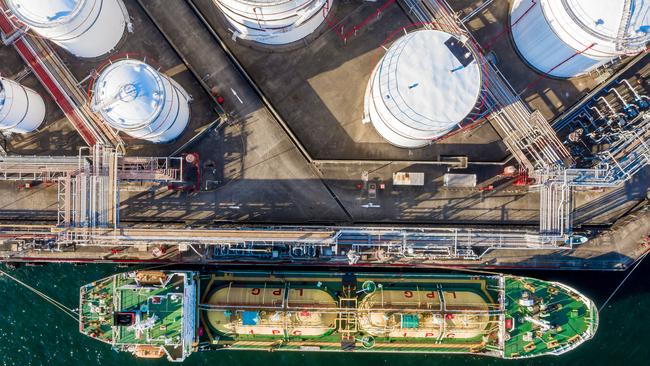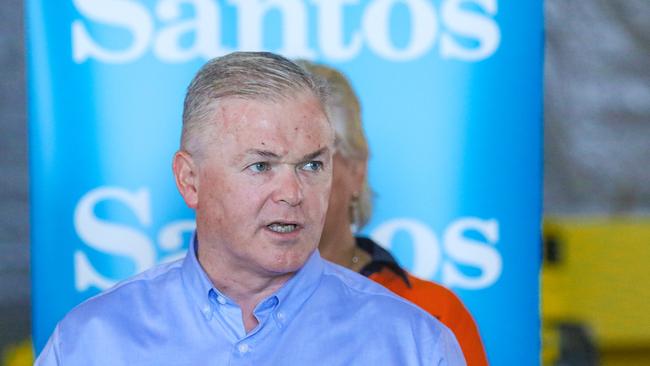Gas giants under the climate pump
The success of the green lobby in targeting oil and gas groups is putting some CEOs — and their relationships — under real strain.

Stuart Nicholls says being CEO of a gas producer is starting to spoil the party. The boss of Western Australia explorer Strike Energy, whose high-profile board includes government adviser Nev Power, said being associated with fossil fuels is now causing social rifts.
“Yeah, I’ve had a couple of friends that started some green funds in Melbourne, who’ve walked out on drinks we’d been having together because they didn’t want to be seen with a gas CEO,” Nicholls said at the APPEA oil and gas conference this week. “It’s like ‘thanks very much’.”
The response by Australian energy producers to climate concerns has been one of the main talking points at Appea for several years now. It was only two years ago that Shell’s Australian chief, Zoe Yujnovich, warned about professional activists “armed with megaphones and iPhones” who were ideologically opposed to fossil fuels and waging a virtual war with religious zealotry.
This year, the activists were invited not only into the conference building but also on stage, sharing a platform with oil giants, including Shell, to thrash out the best path to net zero emissions.
The Australian Conservation Foundation told the conference that producers could not justify opening up new oil and gas fields.
“I think opening up new gas fields knowing the impacts they have on climate change is irresponsible. It is certainly morally irresponsible,’’ ACF chief executive Kelly O’Shanassy said.
The pleas of green groups may have been ignored in the past. But this year the weight of big names – and big money – backed up many of their activist ideas.
Andrew ‘Twiggy’ Forrest, the iron ore billionaire and founder of Fortescue Metals Group, echoed the ACF’s sentiments after taking aim at both Woodside Petroleum and Santos for embarking on new gas projects, describing the duo as fossils for their high carbon emissions.
Woodside’s interim chief executive Meg O’Neill seemed unsure how to tackle the unexpected intervention from a resources industry titan.
“I did look for my T-Rex costume but unfortunately it was in the wash,” Ms O’Neill told the industry forum.
“I don’t think there’s much merit in talking about the comments he made specifically,” she added later. “I don’t have any influence over what he does.”
The weight of big investment – represented by the $US54 trillion ($70 trillion) Climate Action 100+ group – is also increasingly focused on holding companies to account for their climate footprint and suggested the oil and gas industry could go one of two ways.
“There is going to be capital flight that moves away from oil and gas companies that aren’t really far progressed down their transition pathway,” Climate Action 100+ Australia director Laura Hillis said.
“When investors are engaging with companies in this sector, they’re going to be trying to figure out whether companies are doing one of two things: one type of company will lean into the transition, they’ll make some big bets and invest – and they’ll come through stronger and more successful. Then there are companies that will dig in, put their head in the sand and won’t be realistic about what is happening around them. And they’re the ones that will lose a lot of value,” Ms Hillis said.
The industry was knocked by a number of climate decisions in May, hitting three international giants who are among Australia’s biggest oil and gas producers. A landmark International Energy Agency report also shook the sector after finding no oil or gas fields should be opened up if the world was to reach net-zero emissions by 2050 under one of its scenarios.
JPMorgan said there had been a “tectonic shift” in the environmental, social and governance landscape over the past 12 months and said an “inverse greenium” or fossil fuel discount was now priced into the majority of companies with either coal or gas exposure. Woodside, with traditionally a linked exposure to the oil price, has seen its share price remain flat so far this year despite crude increasing by over 40 per cent.

“The evidence in our view is clear. Stocks that have large-scale exposure to fossil fuels are seeing a deepening discount applied by the market,” JPMorgan analyst Jason Steed said. “While quantification of this discount is challenging, it would appear to be at least 10 per cent for the impacted stocks, and in some cases 20 per cent or more.”
Emissions reduction for the oil and gas industry is about to get serious, stockbroker Jarden said on Friday.
“A number of shareholders and activists in Australia and globally are taking action against companies they see as being too slow in dealing with their own emissions and embracing the transition away from fossil fuels,” Jarden analyst Nik Burns said.
“Sub-par shareholder returns can provide a catalyst for change and an opportunity for outside groups to argue that failure to take climate change risk seriously is partly to blame.”
Non-executive directors of Australian producers also face a new level of scrutiny with Climate Action 100+ questioning whether stacking boards with oil and gas veterans was appropriate given escalating climate pressures.
About three-quarters of directors on major Australian energy boards – Woodside, Oil Search, Beach Energy, Santos and Origin Energy – have an oil and gas or mining background, according to analysis by the Australasian Centre for Corporate Responsibility.
After a tiny climate activist hedge fund won several ExxonMobil director roles, Australian boards could be next in the firing line.
“In our view, the message for the boards of Australian oil & gas companies from what happened at Exxon is clear; if they don’t get out in front of this debate, they run the risk of the same play happening to their company,” Mr Burns said.
Still, many of the industry’s biggest names show little sign of backing off new investments citing decades of strong demand ahead for LNG among Asian buyers. A sharp jump in commodity prices as the world recovers from the Covid pandemic has also lifted sentiment: crude is back above $US70 a barrel and LNG has also soared in Asia.
Santos approved its $4.7bn Barossa gas facility in the Northern Territory in March, Woodside will make a call on its $16bn Scarborough gas development by the end of this year while Oil Search is also weighing whether to proceed with a $US3bn Alaskan oil project.
“There is a fundamental disconnect between what the world says it wants from the energy transformation and its consumption patterns,” Santos chief executive Kevin Gallagher said.
“The timing of a zero-emissions energy transformation will be driven by how quickly our customers evolve.”
Delivering green LNG, accelerating carbon capture and storage and gaining exposure to hydrogen appear the industry’s get out of jail cards. Do nothing and the industry faces the same fate as coal.
“We need to lead the charge on decarbonisation before we find ourselves in the same place as the coal industry,” Gallagher said. “That’s what will happen if we think we can do nothing and just keep doing business as usual.”
The reporter travelled to Perth as a guest of APPEA.


To join the conversation, please log in. Don't have an account? Register
Join the conversation, you are commenting as Logout